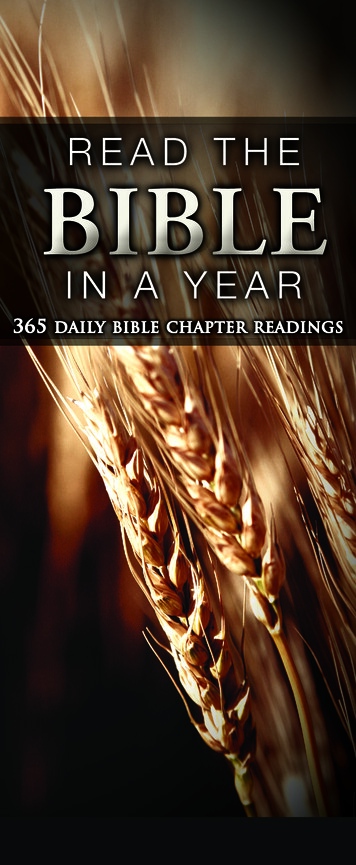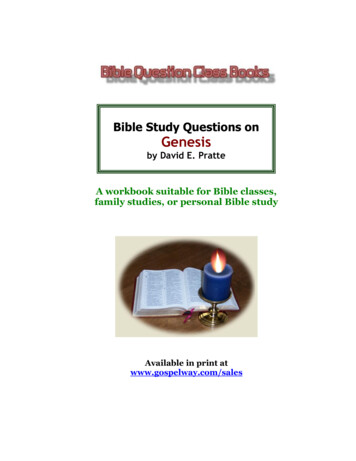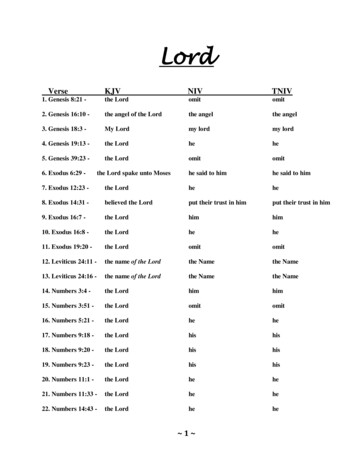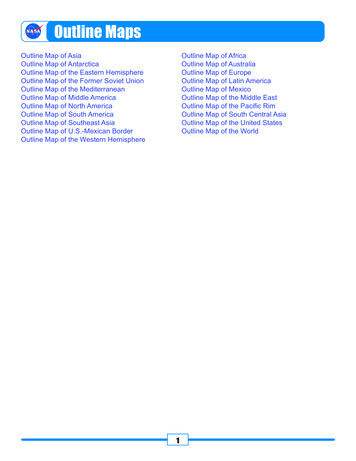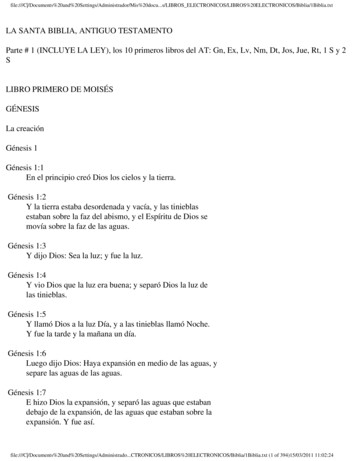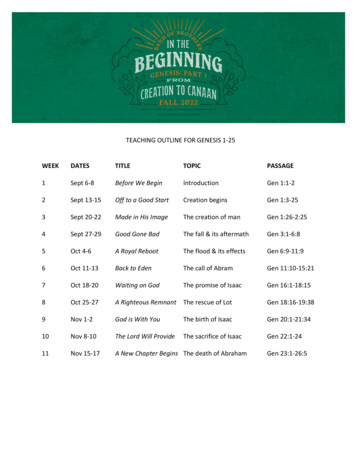
Transcription
TEACHING OUTLINE FOR GENESIS 1-25WEEKDATESTITLETOPICPASSAGE1Sept 6-8Before We BeginIntroductionGen 1:1-22Sept 13-15Off to a Good StartCreation beginsGen 1:3-253Sept 20-22Made in His ImageThe creation of manGen 1:26-2:254Sept 27-29Good Gone BadThe fall & its aftermathGen 3:1-6:85Oct 4-6A Royal RebootThe flood & its effectsGen 6:9-11:96Oct 11-13Back to EdenThe call of AbramGen 11:10-15:217Oct 18-20Waiting on GodThe promise of IsaacGen 16:1-18:158Oct 25-27A Righteous RemnantThe rescue of LotGen 18:16-19:389Nov 1-2God is With YouThe birth of IsaacGen 20:1-21:3410Nov 8-10The Lord Will ProvideThe sacrifice of IsaacGen 22:1-2411Nov 15-17A New Chapter Begins The death of AbrahamGen 23:1-26:5
OVERVIEW OF EACH WEEK’S LESSONWEEK 1: Before We Begin – Gen 1:1-2This will be an introduction designed to set up the rest of the series. The intent is to establish theauthorship, audience, and overall purpose of the book. This lesson will deal with some of thecontroversies associated with the book and set the expectations for how we will be approachingits sometimes controversial and confusing content. We will clarify that our study will take ahistorical/literal interpretive approach. One of the things we hope to emphasize is therelationship between the book of Genesis and the rest of the Pentateuch. It should not be taughtas a separate book or divorced from its original audience.WEEK 2: Off to a Good Start – Gen 1:3-25This lesson will begin our official study of the creation by focusing on the first six days of creation.The primary emphasis will be on the purpose behind the creation. Everything God made wasintended to prepare the earth/Eden for man. Humanity was not just another part of the creationprocess but was intended to be the pinnacle or high point. Everything God made was good andperfectly planned for man’s benefit and enjoyment.WEEK 3: Made in His Image – Gen 1:26-2:25In this lesson, we will cover the creation of Adam and Eve, focusing our attention on the uniquestatus they enjoyed as the only creatures made in the image of God. The emphasis will be on thefellowship they enjoyed with the Father and mandate God gave to them as his vice-regents andthe stewards of all that He had made. One of the things we will highlight is the holiness of theseventh day. This is the only day in the narrative where the phrase, “and there was evening andmorning, the day” does not exist. It seems that the Sabbath “rest” was to havecontinued. God’s work was complete, and He had deemed His creation to be “very good.” Therewas nothing more to do. Man could not work and rest in the beauty of God’s garden – forever.WEEK 4: Good Gone Bad – Gen 3:1-6:8But God’s good creation took a turn for the worse. Sin entered the scene. That will be the focusof this lesson. How did something so good turn out so bad? What happened? This lesson will
cover the fall and its ongoing ramifications. Of course, we will have to deal with topics as originalsin, imputed sin, and the federal headship of Adam. The focus of this lesson will be on the rapidmoral and spiritual decline of mankind as the effects of sin spread throughout God’s creation.What God had deemed to be good has suddenly turned bad, to the point that God “saw that thewickedness of man was great in the earth, and that every intention of the thoughts of his heartwas only evil continually” (Genesis 6:5 ESV). This lesson will set up the story of the flood andGod’s selection of Noah as “a righteous man” (Genesis 6:9 ESV).WEEK 5: A Royal Reboot – Gen 6:9-11:9This lesson will cover God’s decision to destroy all that He had made and will explain why Godchose to start over with Noah. With this one man and his descendants, God will begin again theprocess of filling the earth with those who bear His image. We will explore the relationshipbetween the ark and Jesus, unpacking the salvific similarities between the two. One of the keythemes will be the giving of the covenant to Noah and his sons. In a sense, God has established anew world governed by new rules. Yet, these chapters reveal that nothing had really changedafter the flood. It was a case of déjà vu all over again. It wasn’t long before sin ran rampantthrough the world again, culminating at a place called Babel.WEEK 6: Back to Eden – Gen 11:10-15:21In this week’s lesson, we will explore God’s choice of Abram, a Chaldean who lived in the land ofUr. One of the significant points in this lesson is the movement back toward God. The fall endedwith Adam and Eve cast out of the garden and mankind headed in an easterly direction, awayfrom God. But with Abram’s calling, God sends him west, back towards the “garden” and into arelationship with Him. In a sense, Abram represents the prodigal son returning to his Father’sside. And Genesis 13:10 describes the land He was giving to Abram to be “like the garden of theLord.” Yet, the land of Canaan was far from a paradise. There were enemies and difficulties to befaced. There were challenges that test Abram’s faith and confidence in God’s power. And yet, thissection also includes a covenant and a powerful promise from God.WEEK 7: Waiting on God – Gen 16:1-18:15These chapters include some powerful lessons about trusting God. In them, we have the story ofSarai’s barrenness and her plan to fulfill God’s promise through human means. God had made apromise, but Sarai and Abram were growing impatient. Years had passed and she remainedbarren and unable to bear her husband a son. This lesson will emphasize the danger of trying toaccomplish God’s will through human means. Rather than wait on God, Sarai took matters intoher own hands and the consequences would be painful and long-lasting. Yet, God made anothercovenant with Abram, reassuring His struggling servant that he would become “the father of amultitude of nations” (Genesis 17:4 ESV). And this lesson ends with the promise of a son – Isaac – because nothing is toodifficult for God.WEEK 8: A Righteous Remnant – Gen 18:16-19:38The righteous Abram found himself surrounded by unrighteousness, and this lesson focuses onthe extent of the wickedness in the land. The story of Sodom and Gomorrah provides a stark and
sobering example of mankind’s capacity for sin and rebellion against God. And yet, in the midst ofthose two wicked cities, one man lived whom God deemed to be a righteous man. God sparing ofLot and Hid destruction of Sodom and Gomorrah point to the future redemption that will bemade available through the death of Jesus Christ.WEEK 9: God is With You – 20:1-21:34The main focus of this lesson will be the birth of Isaac. After years of waiting, Sarah and Abrahamare given the son for whom they have long waited. But surrounding this story of the divinepromise fulfilled, we will see the doubt and faithlessness of Sarah and Abraham on full display.The birth of Isaac is sandwiched between two stories involving Abimelech, the king of Gerar. Inthe first instance, Abraham reveals that he still has doubts about God’s providence and power toprotect him. So, he stoops to using his old tricks once again. Yet the emphasis of this section ofGenesis is on the sovereignty of God. He is all-powerful and fully capable of taking care of thosewhom He has chosen and who bear His name.WEEK 10: The Lord Will Provide – Gen 22:1-24This is one of the most confusing and controversial chapters in all the Bible. But we will attemptto explain the purpose behind God’s command that Abraham sacrifice the son for whom he hadso long waited. But this passage reveals how easy it is to misplace our hope. Isaac was thefulfillment of God’s promise but was never intended to become a substitute for God. In a sense,Abraham had begun to place all his confidence in the gift rather than the Giver. The main point ofthe passage is found in the simple phrase: “The Lord will provide” (Genesis 22:14 ESV). Godwanted Abraham to place all his confidence and hope in Him. Isaac was a blessing from God butwas never meant to take the place of God in Abraham’s life. God had provided Isaac and He alsoprovided a substitute to die in Isaac’s place.WEEK 11: A New Chapter Begins – Gen 23:1-26:5This lesson will wrap up the first half of our study on Genesis and set up the Spring semester. In it,we see Moses driving the narrative to a conclusion and setting up a new chapter in his history ofthe people of Israel. The baton is being passed from one generation to another. Sarah dies andAbraham arranges to find a bride for his son, Isaac. With Abraham’s eventual death, the narrativeshifts to Isaac and the covenant promise passes on to the descendants of Abraham. This lessonwill end with the reiteration of God’s covenant promise: “I will multiply your offspring as the starsof heaven and will give to your offspring all these lands. And in your offspring all the nations ofthe earth shall be blessed, because Abraham obeyed my voice and kept my charge, mycommandments, my statutes, and my laws” (Genesis 26:4-5 ESV). And with this statement, thenext chapter in the story of Israel begins.
BIBLIOGRAPHY FOR GENESIS 1-25Genesis: Translation and Commentaryby Robert AlterA new translation of the first book in the Bible honors the meanings and literarystrategies of the ancient Hebrew language, while bringing the stories cohesivelytogether in a narrative format that makes it read more like a fully realized book.The Five Books of Moses: A Translation with Commentaryby Robert AlterThrough a distinguished career of critical scholarship and translation, RobertAlter has equipped us to read the Hebrew Bible as a powerful, cohesive work ofliterature. In this landmark work, Alter's masterly translation and probingcommentary combine to give contemporary readers the definitive edition of TheFive Books.Genesis 1-4: A Linguistic, Literary, and Theological Commentaryby C. John CollinsMuch controversy surrounds the opening chapters of Genesis. They are frontloaded with all manner of vital topics-such as God's work of creating the worldand mankind; what it means to be human; why our present experience is sodifferent from what we find in Genesis 2; how we come to know God and to besure of his love.Collins employs a literary-theological method informed by contemporary discourse analysis inorder to read passages as coherent wholes. He shows how later biblical and inter-testamentalwriters have used Genesis 1-4 and reflects on how these chapters shape a Christian worldviewtoday.
Genesis 1-11: Continental Commentary Seriesby Claus WestermannAs a work of scholarship, it is difficult to greet this commentary with anythingbut enthusiasm. It is certainly the most exhaustive and the very best treatmentof these chapters available to us today. One can have little but praise for thebreadth of Westermann's scholarship, and for the thoroughness, the clarity, andthe fairness with which his discussion is presented. This is a commentary of outstandingusefulness which may be commended without reservation to all serious students of the OldTestament. It will stand as the definitive commentary on Genesis for years to come.Genesis: Beginning and Blessingby R. Kent HughesTime and again in Genesis, God showers his grace upon undeserving humanity,giving us our first tastes of God’s enduring faithfulness that shines throughoutthe entire Bible. R. Kent Hughes, respected pastor, and author of many othercommentaries in this series, takes readers back to the beginning of the Bibleand moves through Genesis with careful exegesis. He explores the superblycrafted structure of the book as well as the weighty themes it contains. For those who preach,teach, and study God’s Word, this exceptionally detailed work will reveal much about thebeginnings of God’s great story.Genesisby Derek KidnerThere are few parts of Scripture over which so many battles―theological,scientific, historical, and literary―have been fought as the book of Genesis. Inthis classic work, Derek Kidner not only provides a verse-by-verse exegeticalcommentary but also lucidly handles the tough issues that Genesis raises.Focusing on the study of Genesis on its own terms, as "a living whole," hehighlights the theological themes of the nature of God, humankind, and salvation. Kidner's clearprose and theological insight will expand readers' understanding of God's character and ofhumanity's nature and destiny.Exploring Genesis: An Expository Commentaryby John Phillipsrespected series.Working from the familiar King James Version, Dr. Phillips not only provideshelpful commentary on the text, but also includes detailed outlines andnumerous illustrations and quotations. Anyone wanting to explore the meaningof God's Word in greater depth—for personal spiritual growth or as a resourcefor preaching and teaching—will welcome the guidance and insights of this
Genesis Unbound: A Provocative New Look at the Creation Accountby John SailhamerNo matter what your position or background, you will be challenged to test yourunderstanding of the Bible's critical opening sentences and reexamine yourbeliefs about the creation of the world through Genesis Unbound.In Quest of the Historical Adam: A Biblical and Scientific Explorationby William Lane CraigWilliam Lane Craig sets out to answer these questions through a biblical andscientific investigation. He begins with an inquiry into the genre of Genesis 1–11,determining that it can most plausibly be classified as mytho-history—a narrativewith both literary and historical value. He then moves into the New Testament,where he examines references to Adam in the words of Jesus and the writings ofPaul, ultimately concluding that the entire Bible considers Adam the historical progenitor of thehuman race—a position that must therefore be accepted as a premise for Christians who takeseriously the inspired truth of Scripture.Gleanings In Genesisby Arthur W. PinkA. W. Pink takes you on a journey through Genesis that shows Christ picturedthrough the patriarchs and salvation and grace depicted through God’s sovereignhand over their lives. As I read, Pink revealed hidden truths that enriched myfaith and love for Jesus. This amazing book will strengthen conviction about thesovereignty of God - a must read!Commentary on Genesisby Martin LutherMartin Luther's Genesis Commentary is the last (and perhaps greatest) work ofLuther. Spanning the last ten years of his life and work, the Genesis Lecturescapture the full wisdom of the Evangelical Reformer. This book is a publication ofLuther's comments on Genesis chapters one through four, copied from thepublic domain text of Lenker (1904). This document and others in the Everyone'sLuther Series may be downloaded for free at wolfmueller.co/everyonesluther.
On Genesis: The Works of Saint AugustineBy Saint AugustineNo other part of the Hebrew Scriptures, aside from the Psalter and sections ofthe prophet Isaiah, captured the interest and aroused the attention of the earlyChurch as did the opening chapters of the Book of Genesis. Augustine of Hippodevoted three treatises to these chapters. The first two On Genesis: A Refutationof the Manichees and his Unfinished Literal Commentary on Genesis are earlyworks. The third and longest The Literal Meaning of Genesis was produced at the height ofAugustine's maturity and has been ranked with his Confessions, The Trinity, and The City of God.This volume brings these three works together for the first time in English and provides a valuableand comprehensive introduction to each one.The Doctrine of Creation:by Norman L. Geisler and Douglas E. PotterA popular introduction to the study of creation firmly rooted in the Bible and theevangelical tradition. Each chapter covers an area of the doctrine, stresses itsbasis, doctrinal importance, and interconnectedness to formulating a Christianview of creation and other doctrines. The study questions help reinforce thematerial and make it usable even for a formal study of the doctrine.Seven Days That Divide the World: The Beginning According to Genesis andScienceby John C. LennoxWith examples from history, a brief but thorough exploration of the majorinterpretations, and a look into the particular significance of the creation ofhuman beings, Lennox suggests that Christians can heed modern scientificknowledge while staying faithful to the biblical narrative. He moves beyond asimple response to the controversy, insisting that Genesis teaches us far more about the God ofJesus Christ and about God's intention for creation than it does about the age of the earth.40 Questions About Creation and Evolutionby Kenneth KeathleyThis accessible volume evenly addresses the issues of modern science and thescriptural texts. The conservative evangelical authors are well-informed oncontemporary scientific views of the universe and also carefully exegete thebiblical texts that pertain to creation. They consider the various angles of thedebate and make constructive suggestions to reconcile science and the Bible.Those who are curious about the origins of life and the universe will want to read this book.Seminary students and serious college students will find this information critical, as anunderstanding of creation is vital to an effective apologetic in sharing the faith.
Controversy of the Ages: Why Christians Should Not Divide Over the Age of theEarthby Theodore CabalFew topics have generated as much heat amongst evangelicals as the age of theearth and the doctrine of creation. Three camps have emerged to offersolutions: young-earth creationists (Answers in Genesis), old-earth creationists(Reasons to Believe), and evolutionary creationists (BioLogos).Controversy of the Ages carefully analyzes the debate by giving it perspective. Rather thanoffering arguments for or against a particular viewpoint on the age of the earth, the authors takea step back to put the debate in historical and theological context. The authors of this bookdemonstrate from the history of theology and science controversy that believers are entitled todiffer over this issue, while still taking a stand against theistic evolution. But by carefully andconstructively breaking down the controversy bit by bit, they show why the age issue is thewrong place to draw a line in the sand.
A Daily Devotionalon Genesis– Part I –By Ken org
2English Standard Version (ESV) The Holy Bible, English Standard Version. ESV Permanent Text Edition (2016). Copyright 2001New Living Translation (NLT) Holy Bible, New Living Translation, copyright 1996, 2004, 2015 by Tyndale House Foundation.Used by permission of Tyndale House Publishers Inc., Carol Stream, Illinois 60188. All rights reserved. 2022 Devotionary / devotionaryblog.com / devotionary.libsyn.comKen Miller
3TABLE OF CONTENTSGenesis 1:1-2: Before We Begin . 5Genesis 1:1-3: The Light of the World. 9Genesis 1:4-13: A Predetermined and Perfect Plan . 13Genesis 1:14-23: The Blessing of Procreation . 17Genesis 1:24-28: Image Bearers. 21Genesis 1:29-31: It Was Very Good. 25Genesis 2:1-3: The Requirement of Rest . 29Genesis 2:4-7: The Real Dirt on Adam. 33Genesis 2:8-17: A Garden of Earthly Delights . 37Genesis 2:18-25: A Match Made in Heaven . 41Genesis 3:1-7: The Short Journey from Doubt to Disobedience . 47Genesis 3:8-13: A Rupture in the Cosmic Order . 53Genesis 3:14-15: Far as the Curse is Found. 57Genesis 3:16-19: A Costly Choice . 63Genesis 3:20-24: Banned for Life . 69Genesis 4:1-7: The Curse Conceived . 75Genesis 4:8-16: Innocent Blood Spilled. 79Genesis 4:17-26: The Bearer of Bad Fruit . 83Genesis 5:1-32: Like Father, Like Son . 89Genesis 6:1-8: A Divine Intervention. 95Genesis 6:9-22: The Right Man for the Task . 99Genesis 7:1-24: God Begins Again . 103Genesis 8:1-19: A Case of Déjà Vu . 107Genesis 8:20-9:7: A New World with New Rules . 111Genesis 9:8-17: The Just and the Justifier . 117Genesis 9:18-29: The Legacy of Autonomy . 121Genesis 10:1-20: The Unfathomable Ways of God . 127Genesis 10:21-32: The Hidden Hope of Salvation . 131Genesis 11:1-9: A Monument to Man’s Futility . 135Genesis 11:10-32: The Fine Line from Cursing to Blessing . 141Genesis 12:1-3: A Call and a Commitment . 145Genesis 12:4-9: The Name Above all Names . 151Genesis 12:10: All in God’s Timing . 155Genesis 12:11-20: The Flawed Hope of Self-Salvation . 159Genesis 13:1-9: Generous to a Fault . 163Genesis 13:10-18: A Tale of Two Travelers . 167 2022 Devotionary / devotionaryblog.com / devotionary.libsyn.comKen Miller
4Genesis 14:1-16: The Battle is the Lord’s . 173Genesis 14:17-24: The King of Righteousness. 177Genesis 15:1-6: The Promise Maker . 183Genesis 15:7-21: God of the Impossible . 187Genesis 16:1-4: The Perilous Plans of Man . 193Genesis 16:5-10: The Mysterious Ways of God . 197Genesis 16:11-16: When Men (and Women) Play God . 201Genesis 17:1-8: Life Under the Gracious Gaze of Almighty God . 205Genesis 17:9-14: The Cost of Commitment . 209Genesis 17:15-27: Walking with and Waiting on God . 213Genesis 18:1-15: Nothing Is Too Hard for God . 217Genesis 18:16-21: Blessed to Be a Blessing . 221Genesis 18:22-33: How Many Righteous Does It Take to Save the World? . 225Genesis 19:1-11: Blinded by the Light . 231Genesis 19:12-22: The Mask of Zoar . 235Genesis 19:23-38: When We Pitch Our Tent Toward Sodom . 239Genesis 20:1-18: Barren Faith . 243Genesis 21:1-7: And the Lord Did as He Had Promised . 249Genesis 21:8-21: Fear Not, For God Has Heard . 255Genesis 21:22-34: The Everlasting, Ever Faithful God. 259Genesis 22:1-3: The Danger of Misplaced Hope . 263Genesis 22:4-14: The Lord Will Provide . 269Genesis 22:15-24: Blessings and Obedience . 275Genesis 23:1-20: Buried in the Land of Promise . 281Genesis 24:1-11: The Wonderful Ways of God . 287Genesis 24:12-28: And It Just So Happened. 291Genesis 24:29-51: A Smooth Operator . 295Genesis 24:52-67: A Divine Love Story . 299Genesis 25:1-18: A New Chapter Begins . 303Genesis 25:19-28: Why Is This Happening? . 307Genesis 25:9-26:5: Hunger for all the Wrong Things . 311 2022 Devotionary / devotionaryblog.com / devotionary.libsyn.comKen Miller
5Before We Begin1In the beginning, God created the heavens and the earth. 2 The earth was without form andvoid, and darkness was over the face of the deep. And the Spirit of God was hovering over theface of the waters. – Genesis 1:1-2 ESVThe book of beginnings. That is how this first book of the Bible is often described, and thatmoniker is well deserved. The first three words of the opening chapter form a rather short andsuccinct thesis statement that establishes the author’s intentions. This lengthy historicalnarrative was intended to provide a divinely inspired explanation for the existence of theuniverse. Within its pages, is found the creation story, describing God’s sovereign act of formingthe stars and planets, the earth, and all its inhabitants, with special emphasis placed upon oneparticular people group – the nation of Israel.Genesis is both a book of history and theology. According to the Merriam-Webster dictionary,theology is “the study of God and of God’s relation to the world” (“Theology.” MerriamWebster.com Dictionary, Merriam-Webster, . Accessed 9 Dec. 2021.). And because Genesis opens with thewords, “In the beginning, God ,” it reveals itself to be an unapologetically God-focused book.He serves as its primary protagonist, appearing on virtually every page and spanning its vasthistorical scope with sovereign authority and power.The 50 chapters that comprise the book of Genesis cover a period of at least 2500 years – fromthe moment of creation to the death of the patriarch, Joseph. Of course, dating a book likeGenesis is difficult, if not, impossible. As will become apparent in our exposition of the book,there has been much debate about the historicity of Genesis. Some regard it as nothing morethan a collection of myths or fables. Others, who defend its authenticity, question its reliabilitywhen it comes to the accuracy of its dating and descriptions. The rise of the Enlightenment inthe 18th-Century, with its emphasis on science and logic, reason and rationalism, led manyChristians to question the accuracy of God’s Word. In the late 18th-Century, a new form ofbiblical study emerged from Germany that encouraged a more scientific approach to biblicalinterpretation. By the mid-nineteenth century, this historical-critical method of examining thebiblical text had come to be known as higher criticism. Its influence was far-reaching, impactingseminaries and theological institutions across the world. With its emphasis on reason andrationalism, higher criticism tends to reject the supernatural aspect of the biblical text. Ofcourse, to a proponent of higher criticism, the book of Genesis provides a treasure trove ofev
For my thoughts are not your thoughts, neither are your ways my ways, declares the Lord. For as the heavens are higher than the earth, so are my ways higher than your ways and my thoughts than your thoughts. - Isaiah 55:8-9 ESV And the apostle Paul provides us with a much-needed reminder of just ill-equipped we are to
